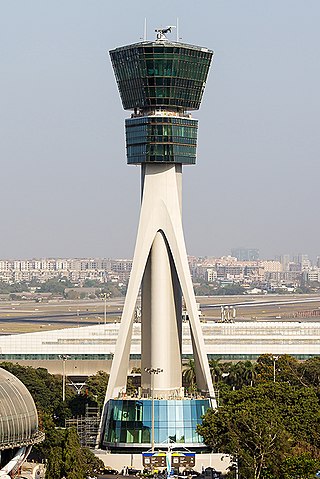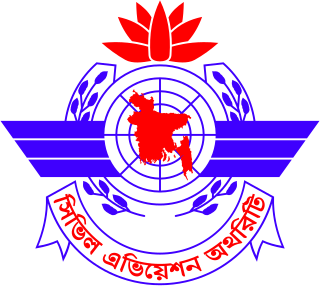
Air traffic control (ATC) is a service provided by ground-based air traffic controllers who direct aircraft on the ground and through a given section of controlled airspace, and can provide advisory services to aircraft in non-controlled airspace. The primary purpose of ATC is to prevent collisions, organise and expedite the flow of traffic in the air, and provide information and other support for pilots.
The world's navigable airspace is divided into three-dimensional segments, each of which is assigned to a specific class. Most nations adhere to the classification specified by the International Civil Aviation Organization (ICAO) and described below, though they might use only some of the classes defined below, and significantly alter the exact rules and requirements. Similarly, individual nations may also designate special use airspace (SUA) with further rules for reasons of national security or safety.

The Defense Contract Audit Agency (DCAA) is an agency of the United States Department of Defense under the direction of the Under Secretary of Defense (Comptroller). It was established in 1965 to perform all contract audits for the Department of Defense. Previously, the various branches of military service were responsible for their own contract audits. The DCAA's duties include financial and accounting advisory services for the Department of Defense in connection with negotiation, administration and settlement of contracts and subcontracts.

The Defense Contract Management Agency (DCMA) is an agency of the United States federal government reporting to the Under Secretary of Defense for Acquisition and Sustainment. It is responsible for administering contracts for the Department of Defense (DoD) and other authorized federal agencies. Its headquarters is located at Fort Gregg-Adams, Virginia. DCMA also administers Foreign Military Sales contracts.

The Defense Finance and Accounting Service (DFAS) is an agency of the United States Department of Defense (DOD), headquartered in Indianapolis, Indiana. The DFAS was established in 1991 under the authority, direction, and control of the Under Secretary of Defense (Comptroller)/Chief Financial Officer to strengthen and reduce costs of financial management and operations within the DOD. The DFAS is responsible for all payments to servicemembers, employees, vendors, and contractors. It provides business intelligence and finance and accounting information to DOD decisionmakers. The DFAS is also responsible for preparing annual financial statements and the consolidation, standardization, and modernization of finance and accounting requirements, functions, processes, operations, and systems for the DOD.

The Defense Logistics Agency (DLA) is a combat support agency in the United States Department of Defense (DoD). The agency is staffed by over 26,000 civilian and military personnel throughout the world. Located in 48 states and 28 countries, DLA provides supplies to the military services and supports their acquisition of weapons, fuel, repair parts, and other materials. The agency also disposes of excess or unusable equipment through various programs.
The Federal Acquisition Regulation (FAR) is the principal set of rules regarding Government procurement in the United States, and is codified at Chapter 1 of Title 48 of the Code of Federal Regulations, 48 CFR 1. It covers many of the contracts issued by the US military and NASA, as well as US civilian federal agencies.
Flight testing is a branch of aeronautical engineering that develops specialist equipment required for testing behaviour and systems of aircraft or testing the atmospheric phase of launch vehicles and reusable spacecraft. Instrumentation systems are developed using proprietary transducers and data acquisition systems. Data is sampled during the flight of an aircraft, or atmospheric testing of launch vehicles and reusable spacecraft. This data is validated for accuracy and analyzed to further modify the vehicle design during development, or to validate the design of the vehicle.
In the United States, the processes of government procurement enable federal, state and local government bodies in the country to acquire goods, services, and interests in real property. Contracting with the federal government or with state and local public bodies enables interested businesses to become suppliers in these markets.
The Information Technology Management Reform Act of 1996 is a United States federal law, designed to improve the way the federal government acquires, uses and disposes information technology (IT). It was passed as Division E of the National Defense Authorization Act for Fiscal Year 1996. Together with the Federal Acquisition Reform Act of 1996, it is known as the Clinger–Cohen Act.

In aviation, airworthiness is the measure of an aircraft's suitability for safe flight. Initial airworthiness is demonstrated by a certificate of airworthiness issued by the civil aviation authority in the state in which the aircraft is registered, and continuing airworthiness is achieved by performing the required maintenance actions.

Civil Aviation Authority of Bangladesh (CAAB) functions as the regulatory body for all aviation related activities in Bangladesh. It is the civil aviation authority operating under the Ministry of Civil Aviation & Tourism. All nine operational airports are operated by the CAAB. A member of International Civil Aviation Organization, it has signed bilateral air transport agreement with 52 states. It is headquartered in Kurmitola, Dhaka.

Bartow Executive Airport is a public airport four miles (6 km) northeast of Bartow, in Polk County, Florida. It is owned by the Bartow Airport Authority.

The U.S. Forest Service airtanker scandal involved a scheme, officially called the Historical Aircraft Exchange Program, in which the U.S. Forest Service would acquire retired U.S. Air Force C-130A transport aircraft and U.S. Navy P-3 anti-submarine patrol aircraft, ostensibly for use as firefighting airtankers, but which ended up with the planes' ownership being transferred illegally to private companies and the aircraft themselves being used for other purposes or even sold for a profit. The controversy resulted in two of the involved principals being sentenced to prison and a number of civil lawsuits.
Defense Support of Civil Authorities (DSCA) is the process by which United States military assets and personnel can be used to assist in missions normally carried out by civil authorities. These missions have included: responses to natural and man-made disasters, law enforcement support, special events, and other domestic activities. A recent example of the use of DSCA is the military response to Hurricane Katrina. DSCA is the overarching guidance of how the United States military can be requested by a federal agency and the procedures that govern the actions of the military during employment.

The Air Force Safety Center is a field operating agency with headquarters at Kirtland Air Force Base, New Mexico, United States.

During World War II civilian flying schools, under government contract, provided a considerable part of the flying training effort undertaken by the United States Army Air Forces.

The Department of Defense Office of Inspector General is an independent, objective agency that provides oversight related to the programs and operations of the United States Department of Defense (DoD). DoD IG was created in 1982 as an amendment to the Inspector General Act of 1978.

The Department of Defense Whistleblower Program in the United States is a whistleblower protection program within the U.S. Department of Defense (DoD) whereby DoD personnel are trained on whistleblower rights. The Inspector General's commitment fulfills, in part, the federal mandate to protect whistleblowers. It also administers the Defense Intelligence Community Whistleblower Protection Program (DICWP), as a sub-mission for the intelligence community. The Inspector General's Defense Criminal Investigative Service also conducts criminal investigations which rely, in part, on Qui Tam relators.

Air medical services are the use of aircraft, including both fixed-wing aircraft and helicopters to provide various kinds of urgent medical care, especially prehospital, emergency and critical care to patients during aeromedical evacuation and rescue operations.